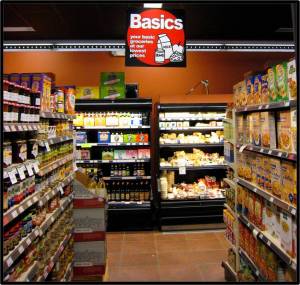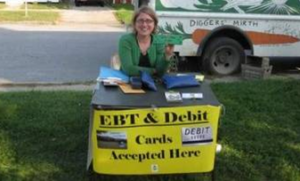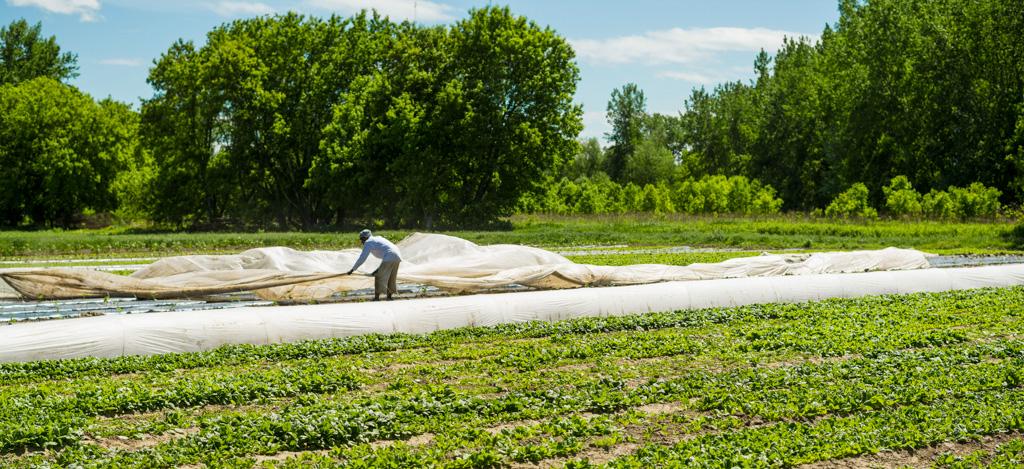Food+Co-ops: Access to Good Food for All

The Basic Goods program at Wild Oats Market offers "the kitchen staples you use often for the best prices we can afford." Photo by Bonnie Hudspeth
- How can we increase knowledge about where to find good food, how to prepare it, and where to use Supplemental Nutrition Assistance Program (SNAP) benefits (aka food stamps, known in Vermont as 3SquaresVT)?
- How can we make good food affordable, and also help people understand the ‘true cost of food’ and how it relates to prices charged by farmers and big box retailers?
- How do folks get to and from the places where good food is available?
One strategy that you’ll see across the two leadership tales below is community partnerships. So let’s take a look at how NOFA-VT and an alliance within the New England cooperative economy are making strides each day toward this important and powerful goal.
The Food Co-ops and Healthy Food Access Program
The Food Co-ops and Healthy Food Access Program is a partnership between the Cooperative Fund of New England (CFNE), a 38-year old regional co-op oriented community loan fund, and the Neighboring Food Co-op Association (NFCA). NFCA is a network of 34 food co-ops and start-up initiatives that are working together toward a shared vision of a thriving regional economy, rooted in a healthy, just and sustainable food system and collaboration among co-ops. At NFCA’s Fall Member Gathering on September 7, more than 100 people from member food co-ops and 10 partner organizations focused their attention on the theme of how to ensure that food co-ops are accessible to low-income consumers.
Hunger Free Vermont’s Faye Conte keynoted the gathering. She points out that, “As community-minded, locally-owned food stores, co-ops are well-suited to address food access in their communities. By creating discount programs, offering affordable products, and creating a shopping environment that is welcoming to everyone, co-ops can help all Vermonters have access to healthy, affordable foods.” Hunger Free Vermont is partnering with NFCA and CFNE to help more co-ops create programs that increase healthy food access and help to end hunger, community by community.
CFNE’s Micha Josephy outlined six leverage points for serving low-income communities through food co-ops:
- Community partnerships, in areas like outreach and program design
- Affordable ownership shares in the co-op
- Affordable products at the co-op
- Education opportunities, such as how to buy in bulk and purchase and prepare healthy, affordable options in the store
- Inclusive marketing, including in-store signage, advertising, and staff training
- Infrastructure, to address hurdles like transportation or language barriers

Rochdale Pioneers storefront
NOFA-VT Programs Zero In on Access
Electronic Benefit Transfer (EBT) at Farmers’ Markets

EBT machine at Old North End farmers' market.
 Food+Co-ops is a monthly series curated by NOFA-VT member Eric DeLuca. Eric serves on the Vermont Working Lands Enterprise Board and previously served on the Vermont Agriculture Innovation Center Board, which together have driven over $4M of investment in the Vermont working lands economy since 2010. Eric managed the International Year of Cooperatives for the US through the National Cooperative Business Association. He is currently partnering with UVM Continuing Education, the Vermont Sustainable Jobs Fund, NOFA-VT and other VT food system leaders to create the first higher ed certificate program focused on food hub management in the country. Eric is a candidate for the Board of Directors at City Market / Onion River Co-op and was previously Project Manager of the Neighboring Food Co-op Association.
Food+Co-ops is a monthly series curated by NOFA-VT member Eric DeLuca. Eric serves on the Vermont Working Lands Enterprise Board and previously served on the Vermont Agriculture Innovation Center Board, which together have driven over $4M of investment in the Vermont working lands economy since 2010. Eric managed the International Year of Cooperatives for the US through the National Cooperative Business Association. He is currently partnering with UVM Continuing Education, the Vermont Sustainable Jobs Fund, NOFA-VT and other VT food system leaders to create the first higher ed certificate program focused on food hub management in the country. Eric is a candidate for the Board of Directors at City Market / Onion River Co-op and was previously Project Manager of the Neighboring Food Co-op Association.
 The Basic Goods program at Wild Oats Market offers "the kitchen staples you use often for the best prices we can afford." Photo by Bonnie Hudspeth
The Basic Goods program at Wild Oats Market offers "the kitchen staples you use often for the best prices we can afford." Photo by Bonnie Hudspeth Food+Co-ops is a monthly series curated by NOFA-VT member Eric DeLuca. Eric serves on the Vermont Working Lands Enterprise Board and previously served on the Vermont Agriculture Innovation Center Board, which together have driven over $4M of investment in the Vermont working lands economy since 2010. Eric managed the International Year of Cooperatives for the US through the National Cooperative Business Association. He is currently partnering with UVM Continuing Education, the Vermont Sustainable Jobs Fund, NOFA-VT and other VT food system leaders to create the first higher ed certificate program focused on food hub management in the country. Eric is a candidate for the Board of Directors at City Market / Onion River Co-op and was previously Project Manager of the Neighboring Food Co-op Association.
Food+Co-ops is a monthly series curated by NOFA-VT member Eric DeLuca. Eric serves on the Vermont Working Lands Enterprise Board and previously served on the Vermont Agriculture Innovation Center Board, which together have driven over $4M of investment in the Vermont working lands economy since 2010. Eric managed the International Year of Cooperatives for the US through the National Cooperative Business Association. He is currently partnering with UVM Continuing Education, the Vermont Sustainable Jobs Fund, NOFA-VT and other VT food system leaders to create the first higher ed certificate program focused on food hub management in the country. Eric is a candidate for the Board of Directors at City Market / Onion River Co-op and was previously Project Manager of the Neighboring Food Co-op Association. 


